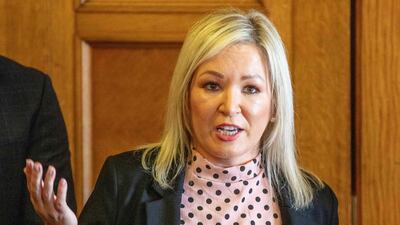The woman set to be Northern Ireland’s new leader on Monday said there can be no excuses for preventing the formation of an executive at Stormont amid a political impasse.
Sinn Fein’s Michelle O’Neill said the British government and the ousted Democratic Unionist Party (DUP) — which previously had the most assembly seats — must accept and respect the result of the Northern Ireland election.
After Ms O'Neill held historic talks with the UK's Northern Ireland Secretary Brandon Lewis on Monday, she said there must be no delay to the restoration of the Stormont power-sharing assembly and her nomination as first minister.
But DUP leader Sir Jeffrey Donaldson has stated he will not re-enter the executive without action from the UK government on the Northern Ireland Protocol, which lays out trade rules with the European Union that includes Ireland.
He said: “I am clear, we will nominate to the executive as soon as the government takes decisive action to deal with the protocol.
"The man with the stopwatch is Brandon Lewis. The people who can deliver the change are Boris Johnson and the government. Frankly the sooner they do it, the sooner we can get things properly functioning again here at Stormont."
Sir Jeffrey said the ball was "now firmly at the feet" of the British government.
“I want the government to act, I expect the government to act," he said. "They know what they need to do, I made that clear to the Secretary of State [Mr Lewis] this morning.”
Ms O’Neill's meeting with Mr Lewis was the first in-person talks with London representatives since Sinn Fein, a party whose guiding principle is a united Ireland, came out top in last week's elections.
"The people have spoken and they have spoken very clearly,” she said. "The message is one of hope, it is also one of optimism for the future, for the political leaders to work together and to make politics work.
"There can be no excuses, there can be no attempt by the DUP or by anyone else to punish the public and leave workers and families high and dry now or in the time ahead."
Sinn Fein became the biggest party in Northern Ireland’s assembly with 27 of the 90 seats, beating the DUP's 25 seats.
It is the first time in Northern Ireland's history that an Irish nationalist party has topped the voting.
Sinn Fein has the right to the post of first minister but a government cannot be formed unless the largest unionist party — the DUP — agrees to join in the role of deputy first minister.
Last administration collapsed
Tussles are continuing over the legacy of Britain's exit from the EU and the post-Brexit rules known as the Northern Ireland Protocol.
Ms O’Neill said she intended to serve as a “first minister for all” in Northern Ireland.
“I accept this election represents a very significant moment of change,” she said. "It really is a defining moment for our politics and for all of our people.
“It also presents us with an opportunity, an opportunity to reimagine the relationships in the society on the basis of fairness and equality and the basis of social justice.
“As a first minister for all, I intend to work with those from different political perspectives through partnership and not division.”
The Irish Taoiseach, Micheal Martin, also urged the DUP, a staunch supporter of Northern Ireland remaining part of the UK, to form a power-sharing executive.
“I think everyone should reflect on the results. It is a significant result,” Mr Martin said.
In February, the DUP's Paul Givan quit as first minister in protest against post-Brexit border arrangements, which led to the collapse of Northern Ireland’s executive. His party has said it will not return to government unless its demands over the customs arrangements are met.
Sir Jeffrey said of the UK government: “They gave a firm commitment to protect our place in the UK internal market.
“They have not done so, they have failed over the last two-and-a-half years to honour that commitment.
“We made clear to the secretary of state that until he honours his commitment ... we will not be nominating ministers to the executive.”











